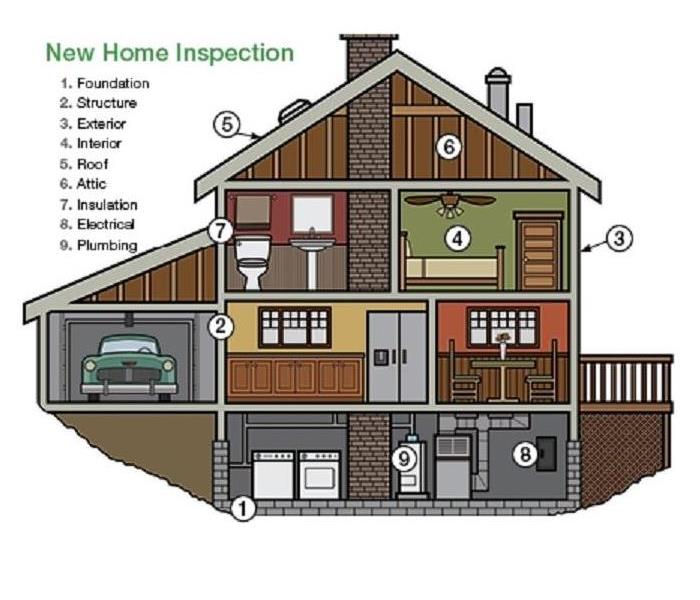What a Property Inspection Checks For, and What's Not Included, Water damage in Haddonfield NJ, Water damage in Mt. Laurel NJ,
8/30/2017 (Permalink)
 What a Property Inspection Checks For, and What's Not Included, Water damage in Haddonfield NJ, Water damage in Mt. Laurel NJ,
What a Property Inspection Checks For, and What's Not Included, Water damage in Haddonfield NJ, Water damage in Mt. Laurel NJ,
What a Property Inspection Checks For, and What's Not Included, Water damage in Haddonfield NJ, Water damage in Mt. Laurel NJ,
A Property is probably the biggest purchase you'll ever make, so when you buy a Property it's important to be sure your potential new Property has a proper inspection before you sign the papers. Getting a qualified home inspector can be an important first step.
A home inspector is a qualified professional who visually inspects the structure and components of a home and looks for any immediate or potential problems. They provide a written report to you with a description of problem areas and may also include recommendations for further evaluation.
You can go over the report with your real estate agent to decide how the results may affect the purchase of your potential home.
What they inspect
Home inspection requirements vary greatly from state to state, but the American Society of Home Inspectors (ASHI) has a Standards of Practice page that outlines minimum and uniform standards that you should expect from an inspection. They include the following:
- Structural elements: Construction of visible foundation, evidence of sagging or bowing of the structure, and window alignment
- Safety: Operating fire and carbon monoxide alarms, fire sprinklers, condition of stairs, hand and guardrails, and garage door openers.
- Grounds: Leaks from septic tank, proper drainage, and condition of the house's driveways, fences, and sidewalks
- Roof: Condition of shingles, any repairs/patches to flat roofs, clear vents, damage to chimneys, and properly working gutters
- Exterior surfaces: Correct clearance between ground and siding material, condition of exterior paint or siding, and properly working lights and electrical outlets
- Attic: Sufficient insulation, proper ventilation, and any sign of leaking or water damage
- Interior plumbing: No damaged or leaking pipes, proper hot water temperature, as well as functioning toilets, sinks, bathtubs, and showers
- Electrical system: Up-to-code condition and type of visible wiring, and proper function of circuit breakers, outlets, light fixtures, and fans
- Appliances: Proper function of stove, dishwasher, refrigerator, microwave, washer and dryer, and all other appliances
- Heating and cooling systems: Condition of furnace, air conditioning (temperature permitting), water heater, chimney, and fireplace
- Basement: Solid foundation, walls, and floors, with no signs of water intrusion or damage
- Garage: Solid foundation, windows, ceiling, framing, and roof; working garage door opener; up-to-code electrical system; and proper function of outlets
What they don't inspect
Again, while there is variation of what home inspectors look for, there are areas that are generally not covered by a home inspection. If you suspect any problems or concerns in the following areas, you may want to schedule an evaluation by a certified specialist:
- Pest control
- Swimming pools
- Asbestos
- Radon gas
- Lead paint
- Toxic mold
What will it cost?
The inspection fee for a typical one-family house varies geographically, as does the cost of housing. Similarly, within a given area, the inspection fee may vary depending on a number of factors such as the size of the house, its age and possible optional services such as septic, well or radon testing.
Do not let cost be a factor in deciding whether or not to have a home inspection or in the selection of your home inspector. The sense of security and knowledge gained from an inspection is well worth the cost, and the lowest-priced inspection is not necessarily a bargain. Use the inspector’s qualifications, including experience, training, compliance with your state’s regulations, if any, and professional affiliations as a guide.
Why can't I do it myself?
Even the most experienced homeowner lacks the knowledge and expertise of a professional home inspector. An inspector is familiar with the elements of home construction, proper installation, maintenance and home safety. He or she knows how the home’s systems and components are intended to function together, as well as why they fail.
Above all, most buyers find it difficult to remain completely objective and unemotional about the house they really want, and this may have an effect on their judgment. For accurate information, it is best to obtain an impartial, third-party opinion by a professional in the field of home inspection.
Finding a home inspector
Be sure you are comfortable with your choice of home inspector. They are extremely important and can help you detect and avoid major pitfalls in the home buying process.
- Talk to your real estate professional. They may be able to recommend a home inspector that they have worked with in the past and trust.
- Ask friends and family. If you know anyone who has recently gone through the home buying process, they may have a good recommendation.
- Look for accredited affiliations. Consumers should look for an inspector who has an affiliation with groups such as the National Institute of Building Inspectors, the American Society of Home Inspectors, and the International Society of Certified Home Inspectors. These are some of the most reputable inspector associations, and their Web sites have a 'find an inspector' service to locate a member in your area.






 24/7 Emergency Service
24/7 Emergency Service